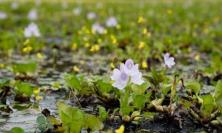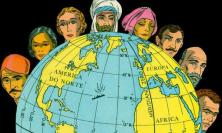Thinking Faith’s previous Lenten reflection highlighted the importance of the relationship between care for the environment and a concern for humanity, and our series on austerity continues as Mary Colwell develops this idea. She describes how ecological concerns can lead us closer to God, by helping us to lead a life of simplicity rather than consumption.
What drives me to be involved in the dizzy, fast moving and often hugely frustrating world of Catholicism and the environment is my deep love of the natural world. For 20 years I made wildlife films and radio documentaries for the BBC, and still do on a part time basis, but increasingly my energies are drawn to encouraging a fruitful partnership between ‘environmentalists’ and ‘religious people’ in my work with the Alliance of Religions and Conservation (ARC). It is a strange preoccupation, and some would say futile, but that is not what I have found and it is certainly not what I witnessed at the Jesuit pre-forum to the World Social Forum in Belem in January 2009. In Belem there seemed to be little distinction between the two categories and it was wonderful to witness.
In many ways the pre-forum was not unlike watching slime moulds. If you have never had the pleasure then I highly recommend it as a surprising and enriching way to spend some hours. Slime moulds are strange slimy blobs that live in forests (very often) and help the recycling process. These extraordinary wobbly globules of life are not really plant, not really animal and for much of their lives they exist independently of each other; a blob here, a blob there, living out their slime-mouldy lives and doing a great service in their small local area. But then, quite suddenly and for reasons we don’t really understand, some chemical trigger causes them all to move together (and sometimes at quite a rate!) and seamlessly coalesce. It is quite a picture, jellies slithering across a forest floor, drawn together in an almost magnetic way. They can travel long distances too. What was once a disparate collection of jellies slowly but surely merge to become one super-jelly. And as so often when we are reduced to the status of being pure observers of an event we can’t control or really understand, it brings a sense of humility and delight.
It might seem a long way from a pre-forum in Belem, but the image stays with me because there we witnessed the coalescing of different worlds in a seamless way that was at once intriguing and heartening to witness. For so long different spheres of human concern have existed more or less in isolation from each other; for example concern for the poor and vulnerable and concern for the environment have been separate entities that have attracted the energies of different people and rarely have those worlds met. But this is increasingly not the case, something is moving in the ether, some trigger is being experienced worldwide that is drawing them inexorably together to produce a very wonderful and powerful way of looking at ourselves and the earth. A super cohesion of ideas, outlook and experience is forming a more holistic approach to the earth and to humanity; no longer are they separate or in conflict, they are now linked together, the health and diversity of one being intricately bound to the health and diversity of the other.
In the case of Belem, the merging worlds were those of the indigenous experience of tribes from many places on earth with the concern for the health of the environment. The intimate knowledge and wisdom of those whose lives are still bound to the environment they live in is at last being seen as essential to informing a new world outlook that is so desperately needed. The recognition that the earth is not just a treasure trove to be plundered for our needs but a gift of immeasurable depth that imbues us with dignity, wisdom and a connection with God, is a product of merging worlds and it is quite beautiful to observe.
In the West many of us have become increasingly removed from the reality of our dependence on the natural world. We take for granted the food in our fridges, the clean water out of a tap, the fresh air we breathe. For many of us these things are on demand and always present, and we left behind many hundreds of years ago the difficult, struggling reality of obtaining food, drink and shelter from source. But for 99% of human history we had to live in rhythm with the natural world because we were hunter-gatherers. If we didn’t understand the pattern of animal migrations, breeding seasons, animal behaviour and sources of clean water, then we died. It is only recently that most of us have settled in cities and divided labour so that we can remove ourselves from a partnership with meat and plant material, and along with that release has come a disregard for natural processes and rhythms which has resulted in the ecological crisis we see today. ‘One of the greatest losses we experienced when we stopped hunting and gathering and became urbanites was the loss of religious systems that underpinned our reliance on nature,’ says Paul Pettitt, Professor of Archaeology at Sheffield University, ‘and one of the greatest problems has been the rise of mono-theistic religions that puts humans, or imaginary human like beings, at the centre of the world. Who cares about a mollusc when there is the Kingdom of Heaven to look forward to?’
Paul Pettit’s stinging observation cuts deeply as he is obviously referring to Christianity as being complicit in the ecological breakdown of the earth’s ecosystems. Many would agree with him, pointing out the biblical requirement to fill the earth and subdue it and have dominion over all living things. Not sentiments that win the heart of dyed-in-the-wool environmentalists. And so Christianity has a duty show in a practical and concrete way that this is not what it seems, that we are charged to tend and keep the earth and see God in all things. Western Christianity has adopted a phrase that I am afraid I dislike intensely for its managerial and controlling overtones – we are called to be ‘stewards of the earth.’ The phrase is not biblical and seems to have been concocted from other parables and stories and applied to our relationship with the earth. But we can never ‘manage’ something so immensely complicated and out of our control. I am much more drawn to the Orthodox view that we are all called to be a priesthood of creation: to bring out the innate holiness of all living things and empower them to be as God intended.
This strikes me as being highly Jesuitical in tone. I once made a Radio 4 programme on Jesuit gardens and I asked Fr Paul Nicholson SJ to explain what it is that defines a Jesuit and his reply was this: ‘Jesuits are men who will do almost anything to help other people get closer to God’. It seems therefore imperative that Jesuits take seriously that aspect of life that really does connect us in a deep way with the Creator God and brings us to our full potential. Folding environmental concern and compassion into Jesuit outreach can no longer be only an option.
At the heart of a life of compassion and love that forever reaches out to God is simplicity. Jesuits and other orders know and give witness to this truth each day because simple living is at the heart of religious life. No religious leader ever preached that the way to holiness is through over-consumption and excess; it seems to be a universal truth that is accepted by all faiths. Therefore it is no surprise to see the theme of this Lent series is austerity. It is interesting that Pope Benedict used the same word in his speech on World Tourism Day in 2008, calling us to adopt a ‘joyful austerity’. Built into a holy life seems to be a measure of discomfort, ‘suffering’ if you will, that leads to joy and peace. This does not mean austerity in an excessive or self-indulgent way, but enough to remind us that all we have is gift and nothing a right, and that God reveals himself in weakness. All people of faith know this to be true – but how to make it a popular idea in a world that is modelled on constant economic growth, and consumerism? ‘Joyful austerity’ is not a sound bite that is likely to be adopted by world politicians anytime soon. Politicians may talk the talk of a greener future where we all live more simply and consume fewer resources, but they can’t really want to see that become a reality. The god of constant growth reigns supreme in the international world of politics and power. So how can the earth sustain and humans thrive if the solution to our ills lies in self-sacrifice? Who is going to promote this? Who is the visionary leader willing to take a different path?
It is true to say that what this earth needs is nothing less than a revolution in the way we live. We have to consume less, own less, travel less, procreate less and want less. None of those will be easy to achieve, and I believe they can only be attained through some kind of revolution of thought or paradigm shift. Revolutions are difficult to instigate, but history shows us they are possible given the right incentive. Eric Hoffer studied what it was that inspired people to mass movements and revolutions and his conclusions must surely strike a chord. He wrote ‘those who would transform a nation or the world cannot do so by breeding and captaining discontent or by demonstrating reasonableness and desirability of the intended changes or by coercing people into a new way of life. They must know how to kindle and fan an extravagant hope.’ (The True Believer: Thoughts on the Nature of Mass Movements, New York, 1951, p 18)
Spiritual leaders must know how to ‘kindle and fan an extravagant hope’, they must know how to inspire people to make sacrifices and face the future with courage; revolutionary leaders must know how to bring out the inner hero in us all and allow us to flourish in a way we never knew possible. That is what the Ignatian family is charged to do – ‘Go set the world on fire!’ My hopes and prayers are that Jesuits and associates grasp this opportunity to lead people to a joyful austerity so that all may become closer to God. I hope they can change the world by helping merge the worlds of care for the poor, the dispossessed, the weak and the afflicted with care for a stricken world. And we can only do that through self-sacrifice and compassion for all.
Shortly after my visit to Belem I found myself in New York and went for a run through Central Park. Here I saw a wonderful quote from Shakespeare: ‘One touch of nature and the whole world is kin’ from Troilus and Cressida. This is a profound vision that shows that nature is a great unifier and binder: it strips away class, money, power and colour and renders us all humble acceptors of the bounties of creation. Let us work towards strengthening the bond with all life and re-imagining what it is to be a human being on the earth; and like the slime moulds, seamlessly break down the flimsy membranes that divide different spheres of concern and work together towards peace and justice for all living things.
Mary Colwell was a producer of TV and Radio at the BBC’s Natural History Unit for 20 years. She is now a freelance producer and Catholic consultant to ARC (Alliance of Religions and Conservation), helping to bring together Catholic faith and care for the natural world.
![]() Alliance of Religions and Conservation
Alliance of Religions and Conservation
![]() Curlew Media
Curlew Media






